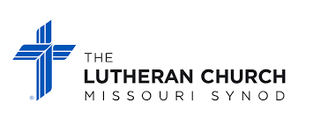What is Lutheranism?
|
|
Luther's Rose: The red heart with the black cross reminds us that the righteous live by faith in the Crucified One. The heart rests in a white rose, showing that faith gives joy, comfort, and peace. The rose is white, because that is the color of the heavenly spirits and angels. The white rose stands in a field of blue, the color of heaven, to show that joy in the Spirit and in faith in this life is only the beginning of future heavenly joy. Surrounding the sky-blue field is a gold ring, to show that happiness and joy in heaven has no end but lasts forever, just as gold is the most noble and precious metal.
VDMA: "Verbum Domini Manet in Aeternum" is the motto of the Lutheran Reformation, which means, "The Word of the Lord endures forever." This confident expression of the enduring power and authority of God's Word is based on the Latin translation of 1 Peter 1:24-25 (also: Isaiah 40:8). The "VDMA" became the official motto of the Smalcaldic League and was used on flags, banners, swords, and uniforms as a symbol of the Lutheran laity who struggled to defend their beliefs, communities, and lives against those who were intent on destroying them. |
What's different between the LCMS and the ELCA? |
So, what are the differences? What makes The Lutheran Church - Missouri Synod (LCMS) different from the Evangelical Lutheran Church in America (ELCA)?
In terms of the official position of these two church bodies, there are three main differences between the LCMS and the ELCA: 1. The doctrine and authority of Scripture. The LCMS believes that the Bible is without error in all that it says. The ELCA believes that Scripture is not necessarily accurate. These differences on the authority of Scripture helps explain why the ELCA ordains women to the pastoral office, while the LCMS does not (1 Corinthians 14:33-36 and 1 Timothy 2:11-14). Similarly, on this basis of what Scripture clearly teach, the LCMS teaches that homosexual behavior is contrary to God's will (Romans 1:18-28; 1 Corinthians 6:9-10), while the ELCA endorses the "marriage" of homosexuals and those with gender confusion, and also allows for their ordination. 2. Commitment to the Lutheran confessional writings. The ELCA, while affirming its commitment to the Gospel of Jesus Christ as witnessed to in the Lutheran Confessions (The Book of Concord), also tends to emphasize the historical character of these writings and to maintain the possibility of dissent to confessional positions that do not deal directly with the Gospel itself understood in a narrow sense. All LCMS pastors are required to affirm that the Lutheran Confessions are a correct explanation of the teachings of Scripture. 3. The level of agreement necessary to join together in one church body. While the LCMS believes the Bible requires agreement in all that the Bible teaches, the ELCA holds that disagreement in some matters of doctrine, such as the mode of Christ's presence in the Sacrament of the Altar, do not prohibit church fellowship, which is directly against orthodox Lutheran doctrine as the Epitome of the Formula of Concord states: "We believe, teach, and confess that in the Holy Supper the Body and Blood of Christ are truly and essential present, truly distributed and received with the bread and wine." (FC-E, Affirmative Theses 1) The ELCA is in fellowship with the following denominations that reject the Real Presence of Christ in the Lord's Supper: Presbyterian Church (USA), Reformed Church in America, United Church of Christ, The Episcopal Church, The Moravian Church, and The United Methodist Church. |



